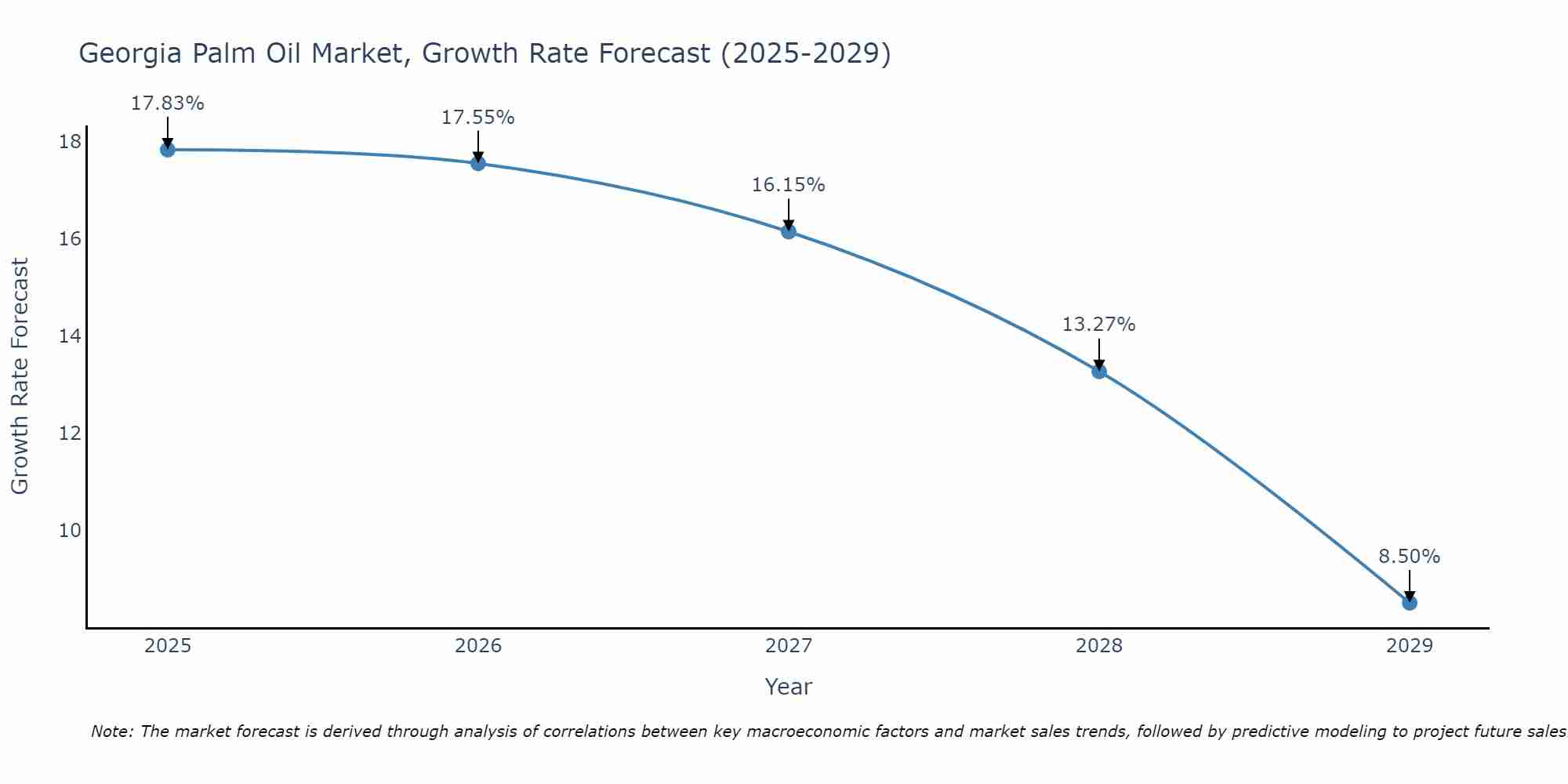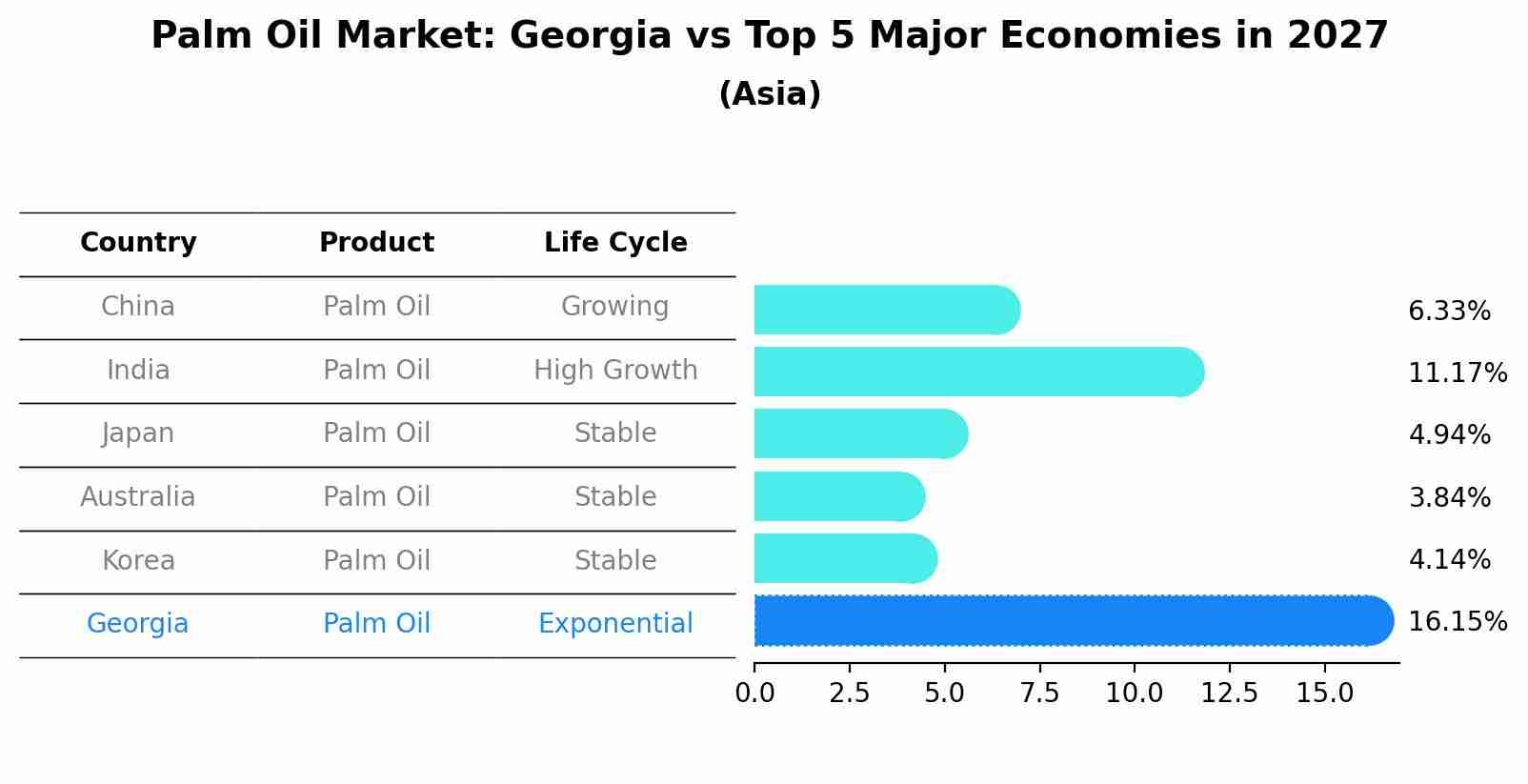Georgia Palm Oil Market Outlook | Companies, Industry, Forecast, Analysis, Share, COVID-19 IMPACT, Size, Value, Growth, Trends & Revenue
| Product Code: ETC383820 | Publication Date: Aug 2022 | Updated Date: Jul 2025 | Product Type: Market Research Report | |
| Publisher: 6Wresearch | Author: Bhawna Singh | No. of Pages: 75 | No. of Figures: 35 | No. of Tables: 20 |
Georgia Palm Oil Market Size Growth Rate
The Georgia Palm Oil Market may undergo a gradual slowdown in growth rates between 2025 and 2029. Although the growth rate starts strong at 17.83% in 2025, it steadily loses momentum, ending at 8.50% by 2029.

Palm Oil Market: Georgia vs Top 5 Major Economies in 2027 (Asia)
In the Asia region, the Palm Oil market in Georgia is projected to expand at a exponential growth rate of 16.15% by 2027. The largest economy is China, followed by India, Japan, Australia and South Korea.

Georgia Palm Oil Market Synopsis
The Georgia Palm Oil Market is relatively small compared to major producers like Indonesia and Malaysia, but it is steadily growing due to increasing demand for palm oil products in the region. The market is primarily driven by its applications in the food industry, particularly in cooking oil and processed food products. Sustainability and environmental concerns have also influenced consumer preferences, leading to a shift towards sustainable palm oil production methods. Georgia`s palm oil market faces challenges related to competition from other vegetable oils, as well as the need to adhere to strict regulations on sustainable sourcing. Overall, the market is expected to continue growing in the coming years, with opportunities for companies to capitalize on the increasing demand for palm oil products in the region.
Georgia Palm Oil Market Trends
The Georgia Palm Oil Market is experiencing a growing demand for sustainable and ethically sourced palm oil products. Consumers are increasingly concerned about the environmental and social impact of palm oil production, leading to a shift towards certifications such as RSPO (Roundtable on Sustainable Palm Oil). Local companies are focusing on transparency in their supply chain and promoting responsible palm oil practices. Additionally, there is a rising interest in alternative sources of vegetable oils, such as avocado and coconut oil, as consumers seek healthier and more environmentally friendly options. The market is also seeing a trend towards product innovation, with companies developing new formulations and packaging designs to cater to evolving consumer preferences for sustainable and natural products.
Georgia Palm Oil Market Challenges
In the Georgia Palm Oil market, one of the key challenges faced is the competition from imported palm oil products. The presence of established international brands often makes it difficult for local producers to gain market share and compete effectively. Additionally, environmental concerns surrounding palm oil production, such as deforestation and habitat destruction, have led to increased scrutiny and pressure for sustainable practices within the industry. Limited awareness among consumers about the benefits of locally produced palm oil compared to imports also presents a hurdle for local producers in building a strong customer base. Overcoming these challenges requires a strategic focus on sustainability, quality differentiation, and targeted marketing efforts to educate consumers about the value of supporting local palm oil producers in Georgia.
Georgia Palm Oil Market Investment Opportunities
The Georgia Palm Oil Market presents promising investment opportunities due to its growing demand driven by various industries such as food processing, cosmetics, and biofuels. Investing in palm oil plantations or processing facilities in Georgia can be lucrative, especially considering the favorable climate and agricultural conditions in the region. Additionally, with the increasing focus on sustainable practices and certifications like RSPO (Roundtable on Sustainable Palm Oil), there is a growing market for sustainably produced palm oil products. Investors can also explore opportunities in research and development for innovative palm oil derivatives or value-added products to cater to evolving consumer preferences. Overall, the Georgia Palm Oil Market offers diverse investment prospects with the potential for long-term growth and profitability.
Jordan Agar Market Government Policies
The government policies related to the Georgia Palm Oil Market focus on promoting sustainable practices and environmental conservation. The state government has implemented regulations to ensure that palm oil production in the region adheres to strict sustainability standards, including the protection of wildlife habitats and the reduction of deforestation. Additionally, there are incentives in place to encourage producers to adopt sustainable farming techniques and obtain certifications such as RSPO (Roundtable on Sustainable Palm Oil). The government also works closely with industry stakeholders to monitor and enforce compliance with these regulations, aiming to strike a balance between economic growth and environmental preservation in the Georgia Palm Oil Market.
Georgia Palm Oil Market Future Outlook
The future outlook for the Georgia Palm Oil Market appears positive as demand for palm oil continues to grow globally due to its versatile applications in various industries such as food, cosmetics, and biofuels. Georgia`s conducive climate for palm oil cultivation presents opportunities for local farmers to expand production and meet the increasing demand. However, concerns over sustainability and environmental impact may influence consumer preferences towards sustainably sourced palm oil. It is crucial for stakeholders in the Georgia Palm Oil Market to focus on promoting sustainable practices and certifications to ensure long-term growth and competitiveness in the market. Additionally, advancements in technology and research efforts to improve palm oil production efficiency and sustainability are likely to shape the future landscape of the industry in Georgia.
Key Highlights of the Report:
- Georgia Palm Oil Market Outlook
- Market Size of Georgia Palm Oil Market, 2021
- Forecast of Georgia Palm Oil Market, 2031
- Historical Data and Forecast of Georgia Palm Oil Revenues & Volume for the Period 2018 - 2031
- Georgia Palm Oil Market Trend Evolution
- Georgia Palm Oil Market Drivers and Challenges
- Georgia Palm Oil Price Trends
- Georgia Palm Oil Porter's Five Forces
- Georgia Palm Oil Industry Life Cycle
- Historical Data and Forecast of Georgia Palm Oil Market Revenues & Volume By Nature for the Period 2018 - 2031
- Historical Data and Forecast of Georgia Palm Oil Market Revenues & Volume By Organic for the Period 2018 - 2031
- Historical Data and Forecast of Georgia Palm Oil Market Revenues & Volume By Conventional for the Period 2018 - 2031
- Historical Data and Forecast of Georgia Palm Oil Market Revenues & Volume By Product for the Period 2018 - 2031
- Historical Data and Forecast of Georgia Palm Oil Market Revenues & Volume By CPO for the Period 2018 - 2031
- Historical Data and Forecast of Georgia Palm Oil Market Revenues & Volume By RBD Palm Oil for the Period 2018 - 2031
- Historical Data and Forecast of Georgia Palm Oil Market Revenues & Volume By Palm Kernel Oil for the Period 2018 - 2031
- Historical Data and Forecast of Georgia Palm Oil Market Revenues & Volume By Fractionated Palm Oil for the Period 2018 - 2031
- Historical Data and Forecast of Georgia Palm Oil Market Revenues & Volume By End-use for the Period 2018 - 2031
- Historical Data and Forecast of Georgia Palm Oil Market Revenues & Volume By Food & Beverage for the Period 2018 - 2031
- Historical Data and Forecast of Georgia Palm Oil Market Revenues & Volume By Personal Care & Cosmetics for the Period 2018 - 2031
- Historical Data and Forecast of Georgia Palm Oil Market Revenues & Volume By Biofuel & Energy for the Period 2018 - 2031
- Historical Data and Forecast of Georgia Palm Oil Market Revenues & Volume By Pharmaceuticals for the Period 2018 - 2031
- Historical Data and Forecast of Georgia Palm Oil Market Revenues & Volume By Others for the Period 2018 - 2031
- Georgia Palm Oil Import Export Trade Statistics
- Market Opportunity Assessment By Nature
- Market Opportunity Assessment By Product
- Market Opportunity Assessment By End-use
- Georgia Palm Oil Top Companies Market Share
- Georgia Palm Oil Competitive Benchmarking By Technical and Operational Parameters
- Georgia Palm Oil Company Profiles
- Georgia Palm Oil Key Strategic Recommendations
Frequently Asked Questions About the Market Study (FAQs):
- Single User License$ 1,995
- Department License$ 2,400
- Site License$ 3,120
- Global License$ 3,795
Search
Thought Leadership and Analyst Meet
Our Clients
Related Reports
- Afghanistan Rocking Chairs And Adirondack Chairs Market (2026-2032) | Size & Revenue, Competitive Landscape, Share, Segmentation, Industry, Value, Outlook, Analysis, Trends, Growth, Forecast, Companies
- Afghanistan Apparel Market (2026-2032) | Growth, Outlook, Industry, Segmentation, Forecast, Size, Companies, Trends, Value, Share, Analysis & Revenue
- Canada Oil and Gas Market (2026-2032) | Share, Segmentation, Value, Industry, Trends, Forecast, Analysis, Size & Revenue, Growth, Competitive Landscape, Outlook, Companies
- Germany Breakfast Food Market (2026-2032) | Industry, Share, Growth, Size, Companies, Value, Analysis, Revenue, Trends, Forecast & Outlook
- Australia Briquette Market (2025-2031) | Growth, Size, Revenue, Forecast, Analysis, Trends, Value, Share, Industry & Companies
- Vietnam System Integrator Market (2025-2031) | Size, Companies, Analysis, Industry, Value, Forecast, Growth, Trends, Revenue & Share
- ASEAN and Thailand Brain Health Supplements Market (2025-2031) | Strategy, Consumer Insights, Analysis, Investment Trends, Opportunities, Growth, Size, Share, Industry, Revenue, Segments, Value, Segmentation, Supply, Forecast, Restraints, Outlook, Competition, Drivers, Trends, Demand, Pricing Analysis, Competitive, Strategic Insights, Companies, Challenges
- ASEAN Bearings Market (2025-2031) | Strategy, Consumer Insights, Analysis, Investment Trends, Opportunities, Growth, Size, Share, Industry, Revenue, Segments, Value, Segmentation, Supply, Forecast, Restraints, Outlook, Competition, Drivers, Trends, Demand, Pricing Analysis, Competitive, Strategic Insights, Companies, Challenges
- Europe Flooring Market (2025-2031) | Outlook, Share, Industry, Trends, Forecast, Companies, Revenue, Size, Analysis, Growth & Value
- Saudi Arabia Manlift Market (2025-2031) | Outlook, Size, Growth, Trends, Companies, Industry, Revenue, Value, Share, Forecast & Analysis
Industry Events and Analyst Meet
Whitepaper
- Middle East & Africa Commercial Security Market Click here to view more.
- Middle East & Africa Fire Safety Systems & Equipment Market Click here to view more.
- GCC Drone Market Click here to view more.
- Middle East Lighting Fixture Market Click here to view more.
- GCC Physical & Perimeter Security Market Click here to view more.
6WResearch In News
- Doha a strategic location for EV manufacturing hub: IPA Qatar
- Demand for luxury TVs surging in the GCC, says Samsung
- Empowering Growth: The Thriving Journey of Bangladesh’s Cable Industry
- Demand for luxury TVs surging in the GCC, says Samsung
- Video call with a traditional healer? Once unthinkable, it’s now common in South Africa
- Intelligent Buildings To Smooth GCC’s Path To Net Zero


















